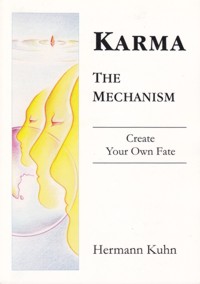
Sakasayatajjivah karmano yogyanpudgalanadatte sa bandah (2)
When we give in to strong negative emotions like anger, pride, the intention to deceive others or greed, we attract subtle matter that attaches karmic mechanisms to our consciousness. This process causes 'karmic bonds' (bandha). (2)
Karma is subtle matter.
This sutra rejects all suggestions that karma may be an inaccessible, mystic force that in an inexplicable way controls the fate of living beings. Karma is nothing more than subtle matter (ajiva). Though it may influence our life - as do all other forms of matter as well - it is fundamentally different from our basic nature - consciousness (jiva).
Our very own activities and our emotional attachments to these activities attract this subtle matter that exists everywhere throughout this cosmos to our consciousness. Karmic matter is actually the agent that enables us (our consciousness) to act within the material context of this universe in the first place.
- Activity attracts karmic matter to our consciousness.
- Ignorance, error, skepticism, negative emotions, laziness, complacency etc. produce bonds between our consciousness and karmic matter.
- The depth of our emotional engagement (the drive, the passion) with which we pursue our desires and ideas determines what strength these bonds will have and for how long we will be subject to their influence.
Once we understand this mechanism, we can separate the accumulated karmic matter from our consciousness (i.e. dissolve our emotional attachment to the themes of life we are - negatively or positively - attracted to). In this process we gain progressively more access to the immense abilities hidden within us.
Although our five senses cannot directly perceive the attachment of karma to our interactive karmic field, many events in daily life demonstrate this mechanism. One example: When we become strongly interested in a particular type of information, we create a subtle attraction for knowledge of this kind. Our strong interest acts like a magnet that draws the desired material towards us. Often friends, co-workers and even total strangers begin to collect information for us though we never explicitly requested it. - An invisible process attracts exactly what we desire.
When we direct this invisible process towards harmful emotions like anger, pride, the intention to deceive others and greed we attach ourselves emotionally to the very situations, persons or objects on which we focus these negative passions. Passionate emotions are the cement that bonds our consciousness to the subtle matter that causes karmic processes. Yet karmic matter is foreign to our innermost nature (consciousness). Any prolonged association with it limits our abilities severely.
As long as we are unaware of this mechanism, we will be at its mercy. As long as we make no attempt to control it, we will be unable to prevent negative situations to occur again and again. Yet the mechanism itself is easy to identify, to understand and to control:
When an event triggers highly charged, negative emotions within us, we usually try to end the situation by rejecting, rationalizing, ignoring or avoiding the event. Yet this solely mental or emotional rejection does not remove the real karmic mechanism we confront at that moment, nor is it even aimed in the right direction.
We need to separate our automatic emotional reaction from the event. We need to realize that it is our continued passionate engagement that attaches negative feelings to an event. The event itself may be entirely neutral and not connected to our emotions in any way.
If - for example - we left too late for an appointment we need to reach in time, we easily feel rising pressure while driving there. The nearer we get to our destination and the less time remains, the more impatient we may react to slow drivers who restrict our speed. Yet the irritation and aggression we now direct towards others has nothing to do with their 'stupidity' or 'inadequate' driving skills. Other drivers usually have no intention whatsoever to slow us down. The real cause for our irritation is our own tardiness and nothing else.
In this situation no amount of rationalizing or ignoring will ease our tension. Only if we fundamentally realize that our own emotional engagement is the real cause for our tension, can we initiate action[34] that will dissolve this tendency once and for all.
If we do not want a particular situation to occur again - i.e. if we do not want to bind new karma of the same type - we need to separate our automatic emotional reactions from the event.
If we respond to a manifestation of karma with a renewed emotional reaction, this will again chain us to exactly those events, persons or objects we do not want to confront any more. It is our own renewed passionate engagement that attracts new karmic matter of the same type.
Our (emotional) attachment to certain limiting themes of life is the only bond between our consciousness and karmic matter. The sutra states explicitly that no other types of karmic bonds exist.
 Hermann Kuhn
Hermann Kuhn
